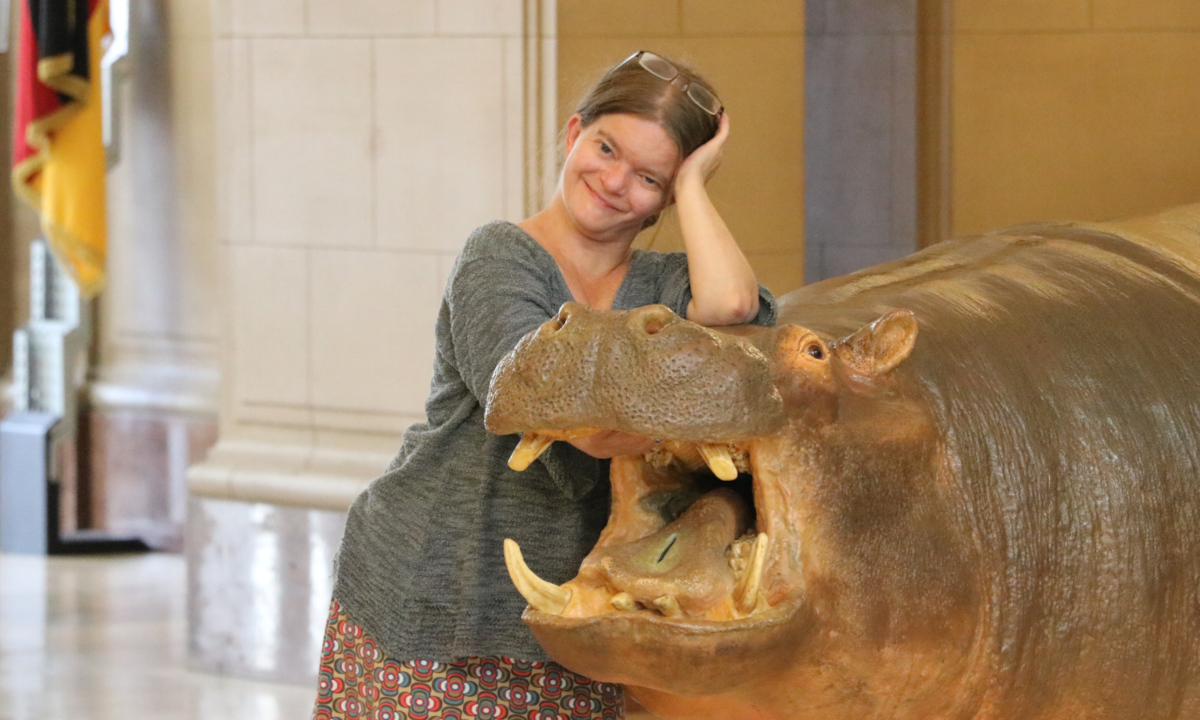Faces of the LIB: Karen Meusemann
“Don’t be afraid to speak up and get involved. And above all: don’t let yourself be distracted by unplanned detours.”
©LIB, Eva Niephaus
As a scientific research assistant, she is currently an interface between the different areas at LIB. With her work, she aims to network people and encourage projects. If her path had not led her into biology and research, she might be touring as a musician today.
What led you to biology and the LIB?
Growing up in the Siebengebirge, my father often took me to the Museum Koenig Bonn when I was a little nipper. I wasn’t always enthusiastic about visiting the museum, but the hummingbirds and dioramas fascinated me. The DNA extraction from onions in my advanced biology course was a trigger for my interest in biology – I found genetics in particular highly interesting. The path to biology and research was not crystal clear for me. A student assistant job initially led me to the Museum Koenig Bonn. During this time, Clas Naumann and Bernhard Misof finally inspired and supported me to take paths I hadn’t planned myself: diploma thesis and PhD at Museum Koenig Bonn. After a rather long detour via Down Under and Freiburg, I have now been happily back “home” at the Museum Koenig Bonn – now LIB – for more than a year.
What would you have become if you hadn’t become a biologist?
I can imagine a lot: a musician or an instrument maker. Originally, in addition to biology, I had also started studying musicology. But I probably would have ended up in organising events around scientific topics. Basically, I can be enthusiastic about many things – the main thing is that they are varied and fun.
Was your job your dream job from the beginning or did it develop into that?
Apart from being a double bass player, which would be a bit funny with a height of 1.30 metres, I didn’t have “the” dream job that I absolutely wanted to do or that I specifically worked towards. As a scientific research assistant, I simply enjoy combining research and organisational work. At the moment, I am an interface and networking point between all areas at the LIB – this job is both challenging and appealing. I am just getting used to the political dimension in my work.
What aspect of your job is a highlight for you?
Diversity: Working with very different people and dealing with a wide variety of topics and methods concerning nature and biodiversity. Another highlight is when employees are motivated and enthusiastic about something after initial scepticism. For example, in the 1KITE project: many people smiled at us at the beginning, but then it became an internationally recognised, very successful and exciting project.
What advice do you have for young people at the beginning of their careers?
Make contacts where you can. Travel around as much as possible. Don’t be afraid to speak up and get involved. And above all, don’t be put off by unplanned detours! Before my path led me to my doctorate and molecular phylogeny, I had to take a long diversions via quality management in catering. You always have the opportunity to learn something new and explore new paths. Your work should bring you joy – with ups and downs, of course.
Is there a favourite place in nature?
I like small lakes or ponds in the forest, just watching dragonflies and others hunting.
Crayfish, fish, butterflies or other animals or plants: Who has their own personal affection?
Tomcats (cats too, of course), bats, springtails and Otopteryx volitans.
How do you spend your free time?
At the moment I’m tinkering around in the vegetable garden and making various culinary delicacies myself (limoncello, mustard, black walnuts). Otherwise, I’m lazy and just doze off – half-covered by my three tomcats.
What would you like the readers to take away with them?
I would like us to take ourselves a little less seriously and, above all, to remain curious.
What do you want people to associate with the LIB in ten years’ time?
The LIB should be regarded as the hub in Germany of biodiversity research and bring people together across all layers of society.
Dr. Karen Meusemann is Scientific Research Assistant at the LIB. She studied biology and did her PhD on molecular phylogeny of hexapods in the priority programme “Deep Metazoan Phylogeny”. She is co-founder of the international project “1000 Insect Transcriptome Evolution” (1KITE). After three years at the Australian National Insect Collection, CSIRO Canberra and almost five years at the University in Freiburg as project coordinator of a research group, she joined the directorate staff at LIB in April 2021.



